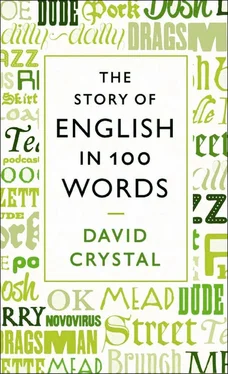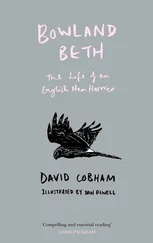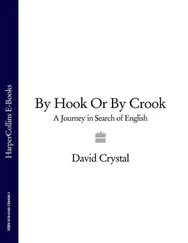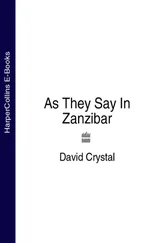There are very few instances of the word bread in Old English, but hlaf appears frequently — and in some interesting combinations. The head of a household was seen as the person who provides bread for all, a hlaf-weard , literally a ‘bread-warden’. A servant or dependant was someone who ate his bread: a hlaf-æta , ‘bread-eater’. A steward was a hlafbrytta , a ‘bread-distributor’. A lady was originally a hlæfdige , ‘bread-kneader’. That -dige ending is related to the modern word dough .
Hlaf turned up quite a lot in Christian religious settings too. Lammas was 1st August, the day when the eucharistic bread was first baked from the new harvest. That name comes from hlaf-maesse , ‘loaf-mass’. Walking to the altar to receive the host was a hlaf-gang , a ‘bread-going’. Bethlehem, where Jesus Christ was born, was a hlaf-hus , a ‘house of bread’.
Hlaf-weard changed its form in the 14th century. People stopped pronouncing the f , and the two parts of the word blended into one, so that the word would have sounded something like ‘lahrd’. Eventually this developed into laird (in Scotland) and lord . It’s rather nice to think that the ‘high status’ meanings of lord in modern English — master, prince, sovereign, judge — all have their origins in humble bread. And it’s the unexpectedness of this etymology that qualifies loaf to take its place in this book.
Loaf then went on new linguistic journeys. Different kinds of loaves appeared, such as white loaf and brown loaf . Several derived forms were coined, such as loaflets and mini-loafs (small loaves), loaf-shaped and loaf-tin . The shape generated a range of non-bread uses, such as meat loaf and sugar-loaf . There were technical senses too, such as the religious use of holy loaf (for bread distributed at Mass).
But nobody could have predicted the 20th-century use of loaf in Cockney rhyming slang. In fact, two rhymes evolved, but only one survived. The popular usage had loaf of bread replacing head . It soon reduced to simply loaf , especially in the phrase Use your loaf , meaning ‘use your common sense’. The Oxford English Dictionary has references to this expression from 1938, and it seems to have been widely used in forces slang. It has a somewhat dated feel about it today.
The defunct usage had loaf of bread replacing dead . You can find it in Auden and Isherwood’s play The Dog beneath the Skin (III.iii.123):
Oh how I cried when Alice died
The day we were to have wed!
We never had our Roasted Duck
And now she’s a Loaf of Bread.
 5. Out — changing grammar (9th century)
5. Out — changing grammar (9th century)
An easy way of making new vocabulary is to take a word and change it into another word by using it in a different way in a sentence. We take a verb and turn it into a noun. Or turn an adjective into a verb. Any part of speech can have its grammar shifted in this way. The process is technically described as conversion or functional shift .
English-speakers have been doing this with words since Anglo-Saxon times. Take a little word like out . It could be a verb: to out was to ‘expel’ or ‘dismiss’. Or an adverb, as in to draw out a sword. Or an exclamation: Out! meant ‘Alas!’, now heard only in some regional dialects. It could be a preposition, as in out the door — a usage disallowed in standard English today, though common regionally. An adjective use appears in the out edge , where today we’d say the outer edge . And from the 17th century it’s been used as a noun, as in the ins and outs (‘the complexities’) and looking for an out (‘a means of avoiding’), as well as in such games as baseball ( two outs ).
New uses continue to emerge. The adjective got a fresh lease of life in the 1960s, when people talked about the out crowd (‘unfashionable set’). A new verb use followed: to out oneself or someone else was to make public an undeclared sexual identity. From there it was a short step to any kind of exposure of private information. Since the 1990s, people can be outed as the originator of an idea, a member of an organisation or the parent of a child.
Out is one of thousands of words which have changed their grammar. Such verbs as laugh, look, push and lift have all become nouns. Adjectives have become verbs ( to calm, to empty ) and nouns ( a nasty, a given ). Nouns have become verbs ( to host, to contact ) and adjectives ( garden chair, railway station ).
Shakespeare was the conversion expert. ‘I eared her language.’ ‘He words me.’ Some of his conversions seem really daring. Even the name of a person can become a verb. ‘Petruchio is Kated.’ But all he was doing was tapping into a natural everyday usage that is still with us. How many parents haven’t said something like this?
Child (at bedtime): But I want to watch Mickey Mouse.
Parent: I’ll Mickey Mouse you if you don’t get those pyjamas on right now!
Even though changes like this are ancient and frequent, people do sometimes dislike conversions. The verb spend is known from the 12th century, and developed a new lease of life in the 20th, when businessmen started talking about advertising spends and the like. Letters began to appear in the press objecting to this ‘horrible new’ word.
In fact the usage wasn’t new at all. John Bunyan used spend as a noun in the 17th century. And the same pedigree is found in noun-to-verb shifts, which are also sometimes criticised. Author has been especially disliked: She’s authored a new book . The first recorded use of author as a verb is 1596, but for some reason it continues to attract criticism.
Today, nouns can become verbs in next to no time. Google was launched in September 1998 ( see §77). People were googling by the end of the year.
 6. Street — a Latin loan (9th century)
6. Street — a Latin loan (9th century)
The Romans spoke Latin. So, later, did the missionaries that arrived in Britain. As a result, quite a few words of Latin origin came into English in its early years. Street , from Latin strata , was one of the first. We find it in the earliest Old English manuscripts, written as stræt — the æ letter representing a long vowel sound a bit like the a in modern English dare .
When the Anglo-Saxons arrived in Britain, they found that the Romans had already built a network of long, straight, paved roads to supplement the many paths which dated from prehistoric times. They used the Germanic word weg (‘way’) to describe these ancient tracks, which had emerged over time through repeated usage, as in hrycgweg (‘ridgeway’). They used the Latin word to describe the Roman innovations — streets .
The names of the four major Roman highways reflect this difference. Watling Street (from London to near Shrewsbury) and Ermine Street (from London to the Humber) were Roman roads. Icknield Way (from Gloucestershire to south Yorkshire) was prehistoric. What we now call the Fosse Way — a Roman road running between Leicester and Axminster — seems to go against this distinction, until we realise that it was originally known as Fosse Street . The name Fosse Way dates only from the 15th century.
Читать дальше

 5. Out — changing grammar (9th century)
5. Out — changing grammar (9th century) 6. Street — a Latin loan (9th century)
6. Street — a Latin loan (9th century)










